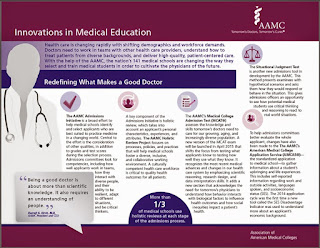4 Ways for Potential Applicants to Maximize The Summer Months
 Sure, getting in some relaxation over the summer to recharge should be on the agenda. Yet keep in mind that the summer months can be vital in acquiring the exposure and/or training necessary to pursue higher degrees in any competitive field.
Sure, getting in some relaxation over the summer to recharge should be on the agenda. Yet keep in mind that the summer months can be vital in acquiring the exposure and/or training necessary to pursue higher degrees in any competitive field.If you're thinking about applying to medical school next year, consider this a great time to springboard yourself into the school year and, ultimately, the medical school application process.
The med school application process is competitive. The majority of applicants hold impressive academic profiles each year. Factors like experience and the personal statement are great ways candidates set themselves apart.
While it's understandable that carving out time to gain a good amount of experience can be difficult to do, prospective applicants should not feel like they need to gain really extravagant experiences from summer months, as some may not be able to afford taking the summer off to travel. Others may need to work to support themselves.
For this reason among many, showing the ability to balance and maximize your time is very important. Below are some simple types of activities to do over the summer:
Volunteer
Not only is lending a hand great for the community, the good thing about volunteering is that there are a variety of directions you can take to fulfill your goals.
Volunteering for any type of healthcare facility is of clear benefit, but don't feel obligated to only seek out opportunities in a medical setting. Allow your volunteer activities to show a range of experiences. But make sure that those experiences are indicative of your leadership capabilities and your commitment to helping.
Volunteering with organizations is another option. There are numerous non-profits around the country like the American Red Cross, for example. Each person's community is different so take a look at what organizations are available in your area.
Research what organizations align with your personal interests. For instance, if you're interested in pediatrics or family medicine, perhaps checking out a youth organization or a children's hospital is worth a try.
Research/Work
 The number of applicants with extensive medical and/or lab experience continues to grow every year, so getting experience of your own will surely do you well as an applicant.
The number of applicants with extensive medical and/or lab experience continues to grow every year, so getting experience of your own will surely do you well as an applicant. Spending some time doing research will also allow you to really understand if medical research is for you.
The Association of American Medical Colleges (AAMC) website has a page dedicated to information on how to acquire lab experience. They point out:
"There also tend to be a lot of research opportunities in the summer, both paid and volunteer. The career center or your pre-health advising office may have a list. Some opportunities may be external to the school..."It may not be too late in the season to find specific research internships, so it doesn't hurt to look. Academic and pre-health advisors can help in guiding you to good resources. It's also a good idea seek out professors or researchers that specialize in a particular area of interest to you.
If research isn't quite your thing, clinical experience is still very important in both quantity and quality. We touched on gaining experience via volunteering but there are also formal programs through hospitals and clinics that would serve you well.
The key here is simply engaging a real medical environment where you can observe both physicians and patients. On top of possibly gaining exposure to a variety of specialties, you should also be able to meet a number of professionals—good contacts you can utilize later as mentors.
But there's also another way to observe a real medical environment...
Shadow a doctor
Shadowing a doctor is one of the best ways to observe what a typical day is like for physicians, offering you realistic insight into particular specialties of medicine.

Some of the insight you'll gain from shadowing a doctor may be what you refer back to when writing your personal statement.
This biggest issue we hear from potential applicants as it pertains to shadowing is that they don't know how to go about it. How do you find a doctor to shadow? The AAMC has some good information regarding this topic.
Study
The MCAT has changed substantially in the spring of 2015, "Designed to help better prepare tomorrow’s doctors for the rapidly advancing and transforming health care system." This will require exam-takers be prepared for new sections.
Use your free time this summer to prepare. The AAMC offers materials like the official guide to the MCAT Exam. Additional materials include the official MCAT Self-Assessment package, and a free e-MCAT practice test among others.
Most medical schools will accept MCAT scores taken within several years. At MSU, we accept scores up to four years from the current admissions cycle.
***
Some additional things to consider:
Whatever you decide to do this summer, be proactive in some fashion. Specifically, get experience doing things that genuinely interest you.
Furthermore, take note of the things you learn and how you feel about it. As we've mentioned, you're personal statement is very important. You'll want to be able to reflect on these experiences and show how they've helped you grow.
Lastly, don't forget to develop solid relationships with both peers and possible mentors. You'll eventually need contacts to write your letters of evaluation and recommendation. Beyond the letters, it's always good to have people who can understand the process and help you get through it.
We're social! Get connected:
Like us on Facebook
Follow us on Twitter
mdadmissions.msu.edu




Comments
Post a Comment